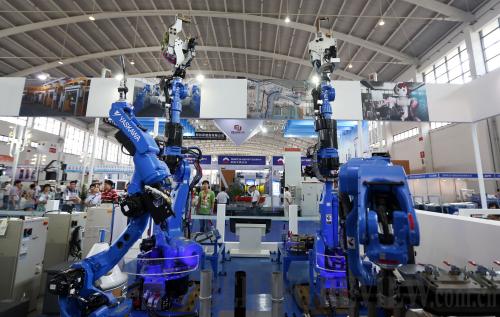|
 |
|
WORKING FOR PEANUTS Farmers harvest peanuts in Houlou Village, Liaocheng, east China's Shandong Province, on September 3 (ZHAO YUGUO) |
A Powerful Combination
About 20 billion yuan ($3.26 billion) will be injected into an e-commerce joint venture (JV) formed by Dalian Wanda Group Co. Ltd., Tencent Holdings Ltd. and Baidu Inc. in the next five years, Wanda's Chairman Wang Jianlin said on August 29.
Wanda is China's leading property developer that runs the largest shopping mall network in China. Cinemas and other recreational facilities are included in the malls. Tencent and Baidu are China's leading Internet companies and also arch-rivals of the country's e-commerce leader Alibaba Group.
Initial investment in the project is 5 billion yuan ($813 million), according to a joint statement released by the three companies. Wanda will control 70 percent of the shares in the new company while Tencent and Baidu will go halves with the remaining 30 percent.
Wanda set up the JV in a bid to bridge the online and offline sales channels, Wang said. "The JV will sell services rather than products," said Wang, adding his intention was to provide a new shopping and entertainment experience to Chinese shoppers.
Wanda expects the number of subscribers of the JV to break 40 million this year, and that by 2015, it will hit 100 million.
PMI Data
Growth in China's manufacturing sector slightly moderated in August, pointing to subdued momentum in the economic recovery, new data showed.
The purchasing managers' index (PMI) came in at 51.1 in August, down from July's 51.7, according to data released by the National Bureau of Statistics (NBS) and the China Federation of Logistics and Purchasing (CFLP) on September 1.
A reading above 50 indicates expansion, while a reading below 50 reflects contraction.
A majority of sub-indices retreated in August, with those measuring production, new orders and purchasing volumes registering the biggest drops.
"The PMI data indicate some downward pressure on the economy," noted Zhang Liqun, an economist at the Development Research Center of the State Council.
But as the indices still stayed above the 50-point watershed, Zhang maintained that the basic trend of a steadily growing economy remains unchanged.
In contrast, official data suggested non-manufacturing activity slightly recovered in August as the tertiary industry was robust and market outlook remained optimistic.
The PMI for the non-manufacturing sector rebounded to 54.4 percent last month, according to the NBS and CFLP on September 3.
The official non-manufacturing PMI tracks business activity in sectors including construction, software, aviation, railways and real estate.
Cai Jin, deputy head of the CFLP, said China's overall non-manufacturing activity grew mildly and stably. He noted the satisfactory performance of the tertiary sector and predicted it would continue rising in the next few months.
Duty-Free Shop
The world's largest duty-free shop (DFS) opened its doors on September 1 in the coastal city of Sanya in south China's island province of Hainan.
The Haitang Bay Duty-Free Shopping Center has attracted nearly 300 international brands. For several of them, including Prada, Rolex and Giorgio Armani, it is the first time they have appeared in a DFS on the Chinese mainland.
With a shopping area of 72,000 square meters, the new facility will replace an existing DFS, which is just one seventh of the new store's size, in Sanya's downtown.
The State Council, China's cabinet, gave Hainan permission to run a duty-free program on a trial basis in April 2011 to promote the island as a world-class international tourist destination by 2020.
From 2011 to 2013, Hainan saw an annual 15-percent increase in its tourism revenue on average, with offshore duty-free sales accounting for 10 percent of the total revenue.
Figures from the local customs show that as of mid-August, the revenue in Hainan's two DFS stores had exceeded 9.2 billion yuan ($1.5 billion).
 |
|
MORE THAN MEETS THE EYE: A smart robot on display during the 13th China International Equipment Manufacturing Expo, which kicked off on September 1 in Shenyang, capital of northeast China's Liaoning Province (YAO JIANFENG) |
Rescue Plan
China will allow overseas investors to establish and own shipping enterprises, according to new guidelines that aim to boost the deficit-plagued sector.
The guidelines issued by the State Council on September 3 pledged to give an open door to foreign investors and private companies in the shipping industry.
Shipping businesses fully owned and controlled by foreign investors can be founded within the China (Shanghai) Pilot Free Trade Zone, according to the guidelines.
China's shipping industry is dominated by large state-owned enterprises such as China Ocean Shipping Group Co. and China Shipping Group Co. They have struggled with slumping revenues since 2008, when the global financial crisis crippled international trade.
The 10 shipping companies listed in China reported a total loss of nearly 1.5 billion yuan ($245 million) in the first six months of this year, according to their financial reports.
Sino-Russo Pipe
On September 1, China and Russia started the construction of a joint natural gas pipeline in Russia's Eastern Siberia, as they implement a natural gas supply contract signed between the two countries.
Russian President Vladimir Putin and Chinese Vice Premier Zhang Gaoli witnessed the welding of the first roll of pipes on the Russian side of the China-Russia East Route natural gas pipeline in Yakutsk, capital of Russia's Sakha (Yakutia) Republic.
According to a 30-year deal reached between China and Russia in May, the east route pipeline will start providing China with 38 billion cubic meters of natural gas annually from 2018.
Chayandin and Kovyktin gas fields in Eastern Siberia will become major sources of supply when the pipeline begins to pump natural gas to China.
The pipeline will be jointly built by China National Petroleum Corp. and Gazprom of Russia, with the latter being responsible for building the part within Russian borders.
Anti-Trust Fines
Fines worth more than 110 million yuan ($17.93 million) have been imposed on 23 property insurers and one insurance association in east China's Zhejiang Province after evidence of price fixing was found.
The Zhejiang Provincial Insurance Association and 23 local property insurance companies were found to have colluded on discounts on car insurance premiums during multiple meetings, the National Development and Reform Commission (NDRC) said on September 2.
The penalties against domestic insurance companies were the latest measures in China's anti-monopoly crackdown. Foreign carmakers and auto parts suppliers have also been fined for monopoly activities since the end of July.
The NDRC said it launched investigation into all 32 insurance companies in Zhejiang after it was tipped off that the provincial insurance association convened with 23 insurance companies to collude on discounts for premiums on newly purchased cars.
Fingerprint Payment
China's largest third-party payment platform, Alipay, is joining forces with telecommunications giant Huawei to develop a service allowing cellphone users to make online payments using fingerprints as verification.
The cutting-edge service will be applied on Huawei's flagship Ascend Mate 7, which is installed with a fingerprint sensor and debuted in Berlin, Germany, on September 4.
Users can make payments or transfer money through Alipay Wallet, a mobile application of Alipay, part of China's e-commerce giant Alibaba Group.
The security of users is protected by a specific technology that prevents third-party applications from being able to read the fingerprints, said Li Xiaolong, a senior Huawei executive in charge of mobile phone business.
Fingerprint payment is a promising step forward in the mobile world, with leading cellphone brands including Apple to Samsung also exploring its commercial use, said Kong Qi, a senior Alipay manager. | 